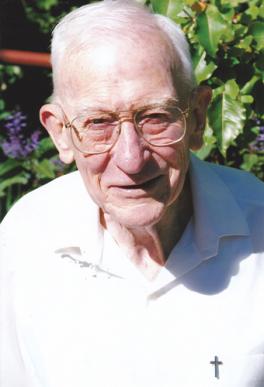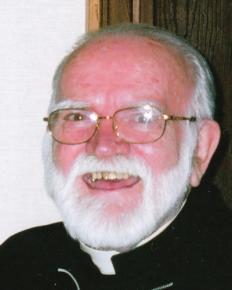 Fr Barry Cairns is a Columban missionary to Japan. He shares with us how his former priest fellow Columban Fr Keith Gorman, now retired in Melbourne, was not only his first parish priest but also helped set his compass for his life as a missionary in Japan.
Fr Barry Cairns is a Columban missionary to Japan. He shares with us how his former priest fellow Columban Fr Keith Gorman, now retired in Melbourne, was not only his first parish priest but also helped set his compass for his life as a missionary in Japan.
When I recall Fr Keith Gorman a surge of gratitude wells up within me. In 1959, the day after finishing Japanese language school in Tokyo I set off on an 8-hour journey south to the parish of Wakayama City. Fr Keith was parish priest. A young priest's first parish priest is important. He helps to set the raw recruit's compass for mission. Here I am at 81 and still on mission in Japan, still with enthusiasm. I put this down to Fr Keith's gentle, indirect guidance and example. I was blessed.
Yakata, Wakayama City, was for Japan, a large parish. Today there are three parishes. I was the youngest of three Curates. Notice I use the word 'Curate.' This was in 1959, three years before the Vatican Council opened. The hierarchical model of Church at that time tended to give parish priests' authority over Curates that sometimes developed into tough power. But not with Fr Keith.
The four of us were a team. Yes! Fr Keith created a true team ministry even before the word was invented! Each of us had our night for catechesis. Each of us had this group (mine was the youth). We all shared what we were doing so the parish had a unity. On Mondays we played tennis together.
The parish of Wakayama was at that time desperately poor. The two main industries, cotton-knitted goods and timber had collapsed because of cheaper imports. The effect of the Pacific War were still evident. War widows were living in packing cases; war wounded in hovels. Fr Keith on his bicycle visited them.
Then came sudden and massive changes. The Vatican II winds blew and Sumitomo Steel came to Wakayama. As a result of the steel works a surge of Christians came from Nagasaki (the 'old Catholic' area) and also the number of people entering the church as catechumens started to grow.
Fr Keith organised a parish council of 30 made up of lay people from each group and each block. There were representatives from an extensive area in the City given to leather workers. In Japan this means the outcaste community or the euphemism "People of the Area."
It was unusual at that time for combined meetings. But thanks to Fr Keith's equal acceptance of everyone, all met and mixed with each other in the one church. At that time I wanted to write about this amazing witness to Christ but was told that it was too delicate a subject in the atmosphere of the time.
Fr Keith's Japanese language was so-so, but his gift of communication was top of the class. His smile and obvious sympathy said so much. Fr Keith's most famous convert was a man known to all as "The Drinker." When he had an overload of 'sake' he would enter the church and ask help from God before going home to face his wife and children.
One time Fr Keith as an intercessor went home with him. "The Drinker" was on his bike weaving dangerously but followed by Fr Keith on his bike to see him safe. Then "The Drinker" joined a catechumenate, was baptised and stopped drinking. He then became known to all by his own name and trade - Mr Fukumoto, the carpenter. His wife and family followed him into the Church. I visit him to this day and 50 year's later we recall Fr Keith with warm nostalgia - and a laugh.
Fr Keith's great ability (ahead of his time) was to imbue the whole parish community with his missionary spirit. He trusted people and assigned them various jobs in the parish. Keith delegated authority, and having given the job, trusted them.
Fr Keith was totally bereft of any sense of direction. He sure got lost in the narrow, tortuous streets of Wakayama. But in this way the Church became kindly known in the back streets because of this lost foreign priest.
Finance, too, was definitely not one of Fr Keith's fortes! Numbers confused him. The area superior told him that 'incidental expenses' should not be the largest item on his financial returns! It was Keith's way out to balance the books in the face of his being lost in the mystery of numbers.
Fr Keith had exactly the same experience in the 70s when we were happily together again on the Turramurra Seminary Staff in NSW. He was domestic staff supervisor (excellent) and house bursar (terrible)! Again he was told that his 'incidental expenses' were too large. I remember the one time Fr Keith got his books to balance; he was so delighted that he framed the print-out for his wall.
I will say that I always enjoyed Fr Keith's supply of corny jokes, not so much for the joke itself but for the distinctive and delightful laugh at the end of each one. I write to Fr Keith every year and always end with gratitude. It's still so strongly felt and genuine. Fr Keith was Christ's instrument to set my compass in my life as a missionary priest.
Editors Note: Fr Keith Gorman is 93 and currently lives in retirement at Mercy Place in Parkville, Victoria where he continues to supply corny jokes and receives delightful laughs.
 Fr Cairns shares with Fr Gorman the ups and downs of everyday life in his Japanese parish during 2012, his letter to Fr Gorman read:
Fr Cairns shares with Fr Gorman the ups and downs of everyday life in his Japanese parish during 2012, his letter to Fr Gorman read:
Dear Keith,
May 2013 be a year when Christ, the source of peace, gives you in abundance that great gift.
I have written often about delegating jobs in the church community. This year we had shocks! Our best catechist and dynamic president of the parish council had a three month battle with cancer and died. I miss his joy in faith.
The parish secretary (for 35 years and six parish priests) got sick in summer and has shifted to a serviced apartment eight parishes down the coast. Before she shifted, her husband aged 87 said he would like to receive Baptism. His wife contacted the wives of an 85, an 82 and a 77-year-old and said, 'How about our husbands get baptised together. All four had shown a deep interest and all four have faith-filled wives. It was a case of faith more caught than taught. What a baptismal ceremony! It was one of the most meaningful in my life.
Blessing are part of my missionary life. I follow traditional Japanese customs using ancient church blessings. On January 9 (Coming of Age Day) I bless 20-year-olds; on November 15 I bless children aged 7, 5 and 3. I bless cars (with drivers promising to drive with respect for others); I bless pregnant mothers, those setting out on a journey and those moving into a new home.
I find that such blessings bring Christ into one's everyday life - where He wants to be.
On November 11, Remembrance Day, at the Commonwealth Cemetery in Hodogaya, I join with the Buddhist monk, a Muslim Imam, a Jewish rabbi, a Hindu cleric and a Protestant Minister in praying for the war dead in this beautiful and extensive cemetery.
People between 70 and 90 years old form the "The window to the stars group" that meets to discuss a topic and share a meal.
For the national 'Respect for Aged Day' (Sept 17) we had 112 aged persons over 75 years of age attend Mass, with an anointing and a meal. Age is balanced with many young parents and children. At times a baby cries during the homily! I stop and say: 'Crying is a baby's way of praying!' All accept the cries and the mother is set at rest. At our Christmas concert a group called 'Dad's Band' do an item with their 3-8-year-olds.
Six parishioners are taking a weekly, 9-month course to be teachers (i.e. Catechists) of groups studying for baptism. This course is used extensively in Japan.
My health? Pretty good. I puff a bit on upgrades. I still drive my 600cc mini-car. I do some mostly fix-it-carpentry. My garden plot is about two billiard tables - great crops of onions, lettuce, tomatoes, cauliflower, garlic. Utter failure with potatoes in tiered tyres. The cycle of 'sew it, plant it, grow it, eat it' does something for the spirit. I was 81 last December.
I am still going along in mission - so much thanks to you who set my missionary rudder in Wakayama as my first appointment. I am deeply grateful to God and you.
You are in my Mass, Keith.
Peace to you,
Barry
Read more from The Far East, March 2013